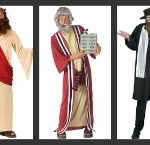In the Peanuts universe, Linus waits every year for The Great Pumpkin to appear on Halloween. When the avatar of Hallow’s Eve fails to materialize, Linus cheerily embarks on another year of expectant waiting. The other characters think he is fanciful at best and a lunatic at worst. Perhaps only those of us who still have our blankies can understand Linus’s peculiar faith, but is it possible that he is privy to some knowledge that every other Peanuts character lacks? Even if there is, ontologically, no being like the Great Pumpkin who exists, is it possible that Linus is still somehow right, while the others are wrong? The Great Pumpkin may be a falsehood and it may be a myth, but to say these two things is not to say the same thing.
Myth in this context does not designate something like oral traditions from ancient times set down in writing, or origin stories, or tall tales. It is instead a way of communicating truth that is not concerned with “narrative” or propositional truths. We moderns (even begrudging ones like me) tend to want to know whether George Washington really chopped down a cherry tree and, upon finding out that he did not, pride ourselves in having no use for the story except an occasion for us to display our superior knowledge. I say instead: the man who believes the story may thereby know something the sophisticated historian cannot.
Tolkien’s poem Mythopoeia opens with the lines,
a star’s a star, some matter in a ball
compelled to courses mathematical
amid the regimented, cold, inane,
where destined atoms are each moment slain.
There is no heroism in looking for what the eyes can see. Rather,
He sees no stars who does not see them first
of living silver made that sudden burst
to flame like flowers beneath an ancient song,
whose very echo after-music long
has since pursued….
Debunking is easy; believing is hard. You can know all the intricacies of nuclear fusion and angular momentum and stellar formation, but do you really know what stars are if you’ve never imagined them as pindot holes in a great black firmament?
Knowledge without wonder hardly deserves the name and is a vain pursuit. Halloween is a chance to develop our mythic faculty and reacquire some of the wonder we’ve lost. A good ghost story will not allow you the satisfaction of quite knowing whether something supernatural has occurred—indeed, of quite knowing what has happened at all. A great ghost story will leave you uncaring about that question but understanding some truth our logic cannot quite grasp.
Russell Kirk’s “gothic imagination” was perfectly suited to this kind of tale. His stories, collected in Ancestral Shadows, achieve greatness one after the other.
* * *
In one story, “Behind the Stumps,” a bureaucratic survey meets resistance in a rural town whose people do not care for interference from busybody regulators. The survey commissions a special interviewer to the task: one Cribben, an insufferably precise sort known for his ability to overcome local prejudices. Cribben, we learn, once was a partner in a foundry but his inability to “[accept a modest level of pilferage as a fixed item of overhead]” drove him out of the business. With the assistance of the dignified local postmaster-cum-shopkeeper, he conquers all of Bear County except Barrens Mill; the roughness of that land has deterred him.
The postmaster warns him that the people there are not worth the trouble of counting, that “the law was made for you and me and the folks we know — not for them, any more than it was made for snakes.” A drunk employee of the shop relates local lore that the matriarch of the family is a witch and that the family there moved the property markers farther and farther, claiming more of their neighbors’ land. The neighbors were too frightened to resist. The postmaster’s wife, a self-possessed woman, tells Cribben that the witch part may be fanciful, but that the family did move the property markers, and the neighbors did simply accede to the new boundaries.
Cribben is of course undeterred and confronts the only Barrens Mill man who ever comes to town. The filthy man spits on him and, in his rudimentary way, declares resistance. Cribben threatens him with all the fury of the law, vowing to visit the property the next day, a Sunday. The man’s demeanor changes from aggression to slight alarm and he mutters “Sunday’s no day for it…. A man that — a man that fusses on Sunday — well, he deserves what he gets.” When he rides off on his horse, Cribben slumps on a nearby bench and confesses to the postmaster that he has a heart condition.
The next day, Cribben, armed with a warrant from a local judge, drives into Barrens Mill to do his duty. His car founders on the unimproved mud road and he continues on foot, past some fence lines made of upturned trees, until he comes to the outer fence of the farm. He discovers that the property is immaculately maintained, a paragon of order and efficiency and austerity. “What power had driven these dull men to such feats of agricultural vainglory?” The farm is devoid of life except one grimy child staring at the house as if waiting for it to act. The farmhouse seems “indefinably mutilated. Then Cribben realized how the house had been injured: it was nearly blind.” The windows had all been boarded, neatly and perfectly, to block the outside light. “It was as if the house had fallen prisoner… and sat Sansom-like in bound and blindfolded shame.”
Cribben, search warrant in hand, enters the still, dark house. He finds a lamp but no person on the first floor and ascends to the second, where he enters a dark bedroom with a massive bed. He slowly approaches the bed and pulls back the covers—revealing a woman so hideous he drops the lamp.
Old, old — how old? She had been immensely fat, he could tell in that frozen moment, but now the malign wrinkles hung in horrid empty folds. How evil! And even yet, that drooping lip of command, that projecting jaw — he knew at last from what source had come the power that terraced and tended Barrens Mill…. Ah, why hadn’t they buried her, for she was dead, long dead, many a season dead.
He attempts to take a step but trips on the lamp, falling forward into the bed. The horror is that he will be in the bed with this dead, disgusting woman—but when he lands on the mattress, he is alone.
Still in his controlled way, he turns toward the door to make use of the tiny sliver of dim light coming through it. As soon as he does, “something moved into the silhouette: imperious nose, pendulous lip, great jaw.” Cribben’s heart has finally borne all it can. Fin.
* * *
This is a near-perfect scary story. It is not much longer than my retelling (though it is much better, of course). It is woven with moral realities, but not explicit moral lessons, and those realities reflect a Christian imagination. Perfection is exposed as sometimes a character flaw (Cribben) and sometimes a sign of evil (the farm)—a lesson that we could perhaps teach in a didactic format, but which is much better communicated here. And, best of all, the story does not answer any of the questions it sets up: is there really a witch? Was the woman well over a hundred years old? Would she have killed Cribben?
To insist on answers is to miss the point. The ghost tale forces us to deal with the problem of unanswered questions—of not being able to assimilate everything we observe into an orderly system. To demand that reality conform to our provisional understanding of our own is a more general form of a recognizably human-centered theology. Jesus says that He and the Father are one, that He is God but not the Father and God is most certainly one. But you have to choose—either one or more than one!
Some solve this problem by denying the deity of Christ (Arians, for example) while others simply reject monotheism (Mormons, for example). Orthodoxy, I am happy to announce, instead revels in the inscrutable. One or more than one? Both. We are unlikely to be comfortable saying things like this if we exclude such inscrutability from the rest of our experience.
On Halloween, take some time to put aside your scientific mind and allow yourself to simply not know for sure.
photo credit: Express Monorail via photopin cc












